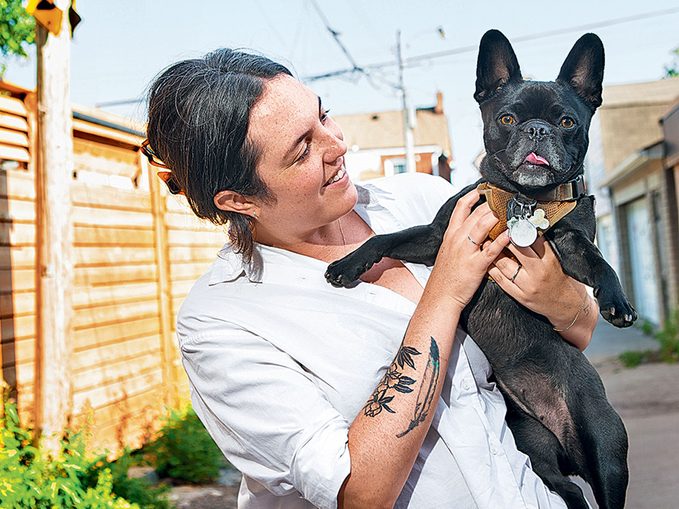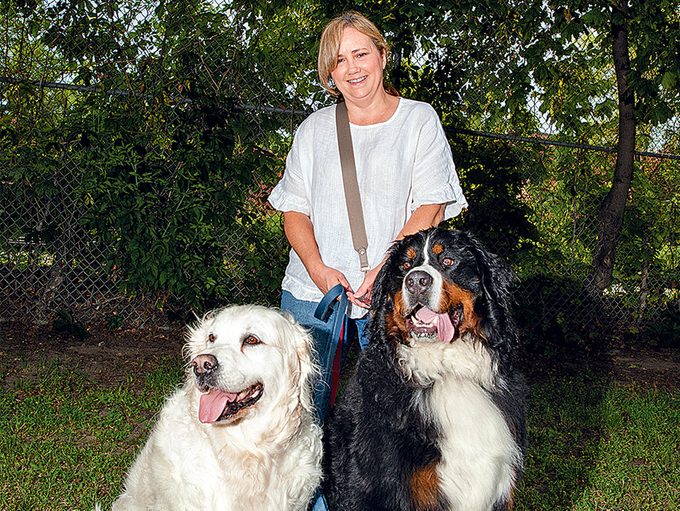Here’s Why Dogs Are Great for Your Health, According to Science

Furry friends do more than sit, stay and fetch—they do wonders for your physical, mental and social wellbeing.
According to veterinarian Annette Louviere, pets aren’t just good for your health. They’re great. It starts with your hormones: “Simply petting an animal helps to reduce cortisol levels, which is the primary stress hormone, while interacting with animals can increase oxytocin levels, the same hormone associated with feelings of love and bonding,” she says.
Dogs can also affect or health indirectly by encouraging us to move around, get outside, laugh and play. Research published by the Centers for Disease Control and Prevention found that owning a pet can decrease your blood pressure, lower your cholesterol and triglyceride levels, slow your heart rate, foster a stronger immune system and encourage better memory and cognitive functions. Pet owners also report less anxiety and lower rates of depression and PTSD than those without animals.
In 2008, the National Institutes of Health in the U.S. launched a 10-year research initiative to examine the relationship between pets and human health, and they uncovered some remarkable data. In one study, scientists looked at 186,421 heart attack victims—some dog owners, some not—a year after they’d suffered their myocardial infarctions. People with canine companions were far more likely to be alive than were those without, regardless of the severity of the heart attack.
Another study followed older adults and found that those who regularly walked a dog had greater mobility inside their homes (a boon for people who wish to age in place) than others who took part in the study.
And a study of more than 2,000 adults found, not surprisingly, that dog owners who regularly take their pooches for a stroll were more physically active and less likely to be obese than those who didn’t own or walk a dog.
Pet owners generally report a greater sense of well-being and happiness, too, and for dog owners, those feelings are certainly linked to the social connections they forge on walks and in dog parks. Newsflash: Dog owners love to chat about their pooches. And studies show that more conversations with acquaintances help you stay socially connected, which in turn leads to living longer with fewer mental and physical declines as you age.
(Learn more about why the secret to a healthy heart is having a dog—or cat!)
We asked a few people on the streets of Toronto what they love about their pups:

Bernard with Oscar, a four-year-old cocker spaniel. “He’s very outgoing… he’s all about the hang. I can’t go a block without people smiling or saying something to me about him. It took a little getting used to. I have an autism disability and I spend a lot of time alone, so his companionship is really important to me.”

Jess with Lucy, a two-and-a-half-year-old French bulldog and pug mix. “She’s a loving dog, and she’s also unhinged and can be a big brat. But she makes me laugh so much. My husband and I walk her together every morning, and it’s a really nice time to hang out, talk about work and decompress. It’s an incredible way to start the day.”

Ernie with Benny, a two-year-old poodle mix. “Benny is bilingual: He understands Portuguese and English. He’s so bubbly and full of energy. I love dogs because there’s nothing phony about them. When they’re mad, they’re mad. When they’re good, they’re good.”

Dianne with Oliver (left) and Charles, an eight-year-old white golden retriever and a three-year-old Bernese mountain dog. “Charles is big in every way. He’s in your face, and he’s all about himself. Oliver is laid back and a total people pleaser. He’s been with me through a lot. My kids are all grown up now, so my dogs are everything. My husband says he’s in third place.”

Anabel with Benji, a one-year-old Maltipoo. “Sometimes I don’t feel like going out for a walk, but once I’m out here, I’m always so grateful.”




